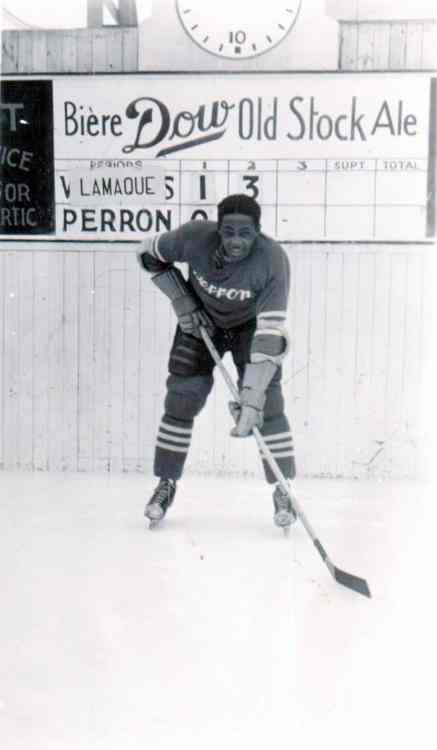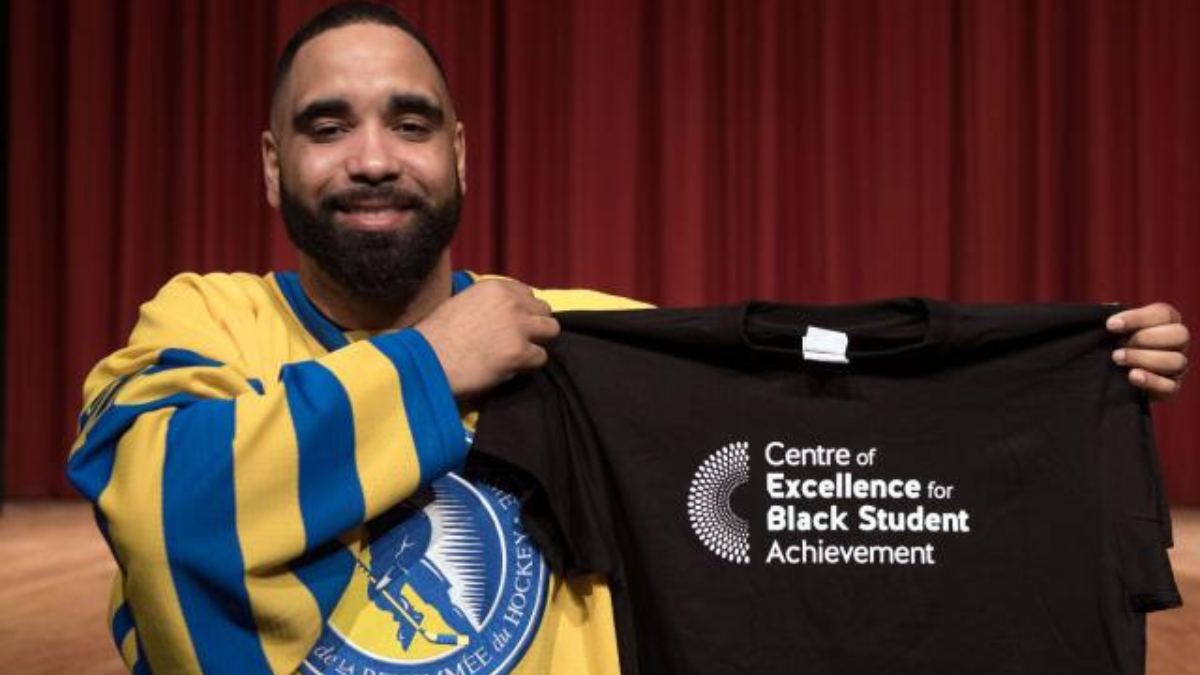On Feb. 29, the Northwestern University Kellog Alumni of Chicago and Sports Business Clubs hosted a screening of the touching and heartfelt documentary “Beyond Their Years.”
The film depicts the incredible stories of the baseball hall-of-famer Buck O’Neil and hockey hall-of-fame trailblazer Herb Carnegie, whom many regard as the best player never to play in the National Hockey League. Unfortunately, Carnegie passed away in 2012, and O’Neil lost his battle with bone marrow cancer six years earlier. However, Carnegie’s grandson Rane attended the special event and participated in the panel discussion as a representative of Herb’s family and his aunt Bernice, who was on Zoom.
Rane, also featured in the documentary, spoke with The Chicago Defender about his grandfather’s immense legacy and the significant impact he had on his life.
“I was fortunate to be a part of the great event,” Rane said. More importantly, the people in that room, the genuine curiosity and empathy that was in that room, was just overwhelming and surreal, to be quite honest. It’s something that I’ll never forget.
“It was an experience of a lifetime for me. It’s something that I’ll cherish for the rest of my life,” he said.
Like Grandfather, Like Grandson: Passing Down The Love of Hockey

Rane’s grandfather, Herb, was a prominent hockey legend who played in the professional ranks, including the Quebec Provincial Hockey League, the Quebec Senior Hockey League, and the Ontario Hockey Association Senior A League, in the 1950s. Herb once received an offer to play for the NHL’s New York Rangers in 1948 but eventually turned it down because the pay was less than what he made playing professional hockey in Canada.
The worst act of racism Herb experienced came a decade earlier when former Toronto Maple Leafs owner Conn Smythe said he would sign him to a contract on the condition he could paint himself white.
However, experiences such as these didn’t deter Herb from sharing the game with his grandson.
Rane’s expedition with hockey began at age five, thanks to Herb, who brought his grandson a pair of skates and took him to Toronto’s Downsview Arena for the first time. Despite suffering from glaucoma, Herb wanted Rane to inherit his love for the game.
“My grandfather, who was legally blind at that time, was holding onto the boards as I was holding onto a pylon for my first steps onto the ice,” Rane said. “My grandfather never shared with me the pain that he experienced with the game. He never tainted me. He introduced me to hockey and said, ‘Go have fun.'”
Rane was soon hooked and would follow in his grandfather’s footsteps.
From Hockey Glory to Regret
He played for the Toronto Marlboros AAA squad as an amateur hockey player.
Rane eventually started his junior hockey journey with the Belleville Bulls for three seasons, during which he played with future NHL All-Star Jason Spezza and former Black NHLers Andre Deveaux and Nathan Robinson. He even played half a season with the Plymouth Whalers and finished his last two seasons in the junior ranks with the Halifax Mooseheads.
In his final year, he was the team’s second-leading scorer with 96 points while serving as captain during the 2005-06 campaign. Like his grandfather, Rane was a prolific scorer, recording a team-high 46 goals that same season. Although that campaign was one of the biggest highlights of his career, he was also a victim of overt racism, just like his grandfather.
[perfectpullquote align=”full” bordertop=”false” cite=”” link=”” color=”” class=”” size=””]”I’ll never forget my teammates asking me why it was okay when Black people use the ‘N’ word with each other, but they (his former white teammates) can’t,” he recalled. “They wouldn’t say it in that regard. They would actually say nigger. So, having to be in situations like that, you’re shocked for one. You don’t know what to say, or at least I didn’t. Maybe somebody else would’ve handled it differently. But, in that moment, I remembered being shocked,” he said. [/perfectpullquote]
Rane added, “You’re also young. You don’t want to make a big deal out of it because you also don’t want it to possibly spiral into something more than just that. It was the quickest way to just move on to the next subject. It happens more times than I like to remember.”
But despite those unpleasant moments, he still admires the Belleville Bulls for producing more Black players after he left.
“Hats off to the Belleville Bulls,” he said. “For thinking outside of the box to bring diversity to Belleville and for the town to really embrace myself, Andre and Nathan. We had our experiences just like every Black athlete in the game of hockey unfortunately. But my experience with the town of Belleville and the organization of being surrounded with players who look like me, made my junior experience something that gave me a sense of security. I owe a lot to Andre and Nathan.”
Rane’s introduction to professional hockey came in the 2006 AHL playoffs when he played two games for the Milwaukee Admirals. The following season, he joined the Bakersfield Condors in the East Coast Hockey League. He also played for the Laredo Bucks and Mississippi RiverKings in the Central Hockey League and played for four teams internationally over the next three seasons in France, Sweden, and Finland before retiring in 2011.
“I always felt in my professional career that I was never given the same opportunities as everybody else,” he said.
Rane said that when he reflects on his career, he wonders why he never got the opportunity to play at a higher level.
“I also look at the things I didn’t do that could’ve given me a much better opportunity to get an opportunity. I could’ve gone to the gym, focused on my off-ice habits a little better, and by a little, I mean a lot,” he said.
Rane said he could have gone to school and been more mature about taking advantage of his chances.
“I didn’t understand the opportunity that I had. I didn’t appreciate it.”
Overcoming Addiction to Carry on a Legacy
Shortly after his retirement, Rane worked in the corporate world as an account manager for Cambridge Global Payments. He also did enterprise sales for AFEX for over a year. It was also a turbulent period where he said he indulged in cocaine.
However, Rane managed to quit and is now five years sober. In 2018, he decided to take a new direction by coaching youth hockey in his hometown with his friend Nathaniel Brooks.
Rane also embarked on another journey by giving back to his community. He launched the OWN (Our Way Now) Aces Sports Group, a mentorship program that supports and guides kids in hockey. OWN also helps kids and their parents fight against systemic racism and drug addiction.
He would later become a board member of his grandfather’s Future Aces Foundation and an advisor for the Carnegie Initiative that same year in 2020, which grants kids of all races a chance to play hockey. It is also an organization founded by his aunt Bernice and “Beyond Their Years” producer Bryant McBride. The NHL is also one of the Carnegie Initiative’s collaborating partners.
For Rane, it was all about building on his grandfather’s legacy by continuing his career in financial planning and being able to establish college scholarships for kids to attend Canadian universities.
“The only reason why I started my mentorship organization is that I wish I had a Herb Carnegie in my life back when I was a teenager,” he added. “That’s why I do what I do now. I know that I can make a difference. I found something that was motivating me to be the best version of myself. It’s something that I’ll never take for granted. And I love it.”
Rane said he wants to pass his knowledge and experience of the game to his 11-year-old son, Miles.
“I would want him hopefully to have the same love that I have for the game of hockey,” he said. “And my son’s experience hasn’t been the same as mine.
Rane said the most difficult thing about parenting is watching the pressure his son sometimes feels because of his family’s legacy.
“I have to remind him that he is Miles, and he is amazing for the young person that he is,” Rane said. “I hope that he gets long-lasting relationships through the bonding that he has with his teammates and life lessons that he’ll learn about being a great teammate.”
While growing up with his grandparents, Rane would receive inspirational advice from Herb. Quotes like “You can’t score goals from the penalty box” and “Not every negative is a positive” are memorable messages he will cherish forever.
But there’s one piece of advice the 39-year-old could visualize Herb telling him today if he were still alive.
“Keep going, youngster,” Rane said.
It’s sound advice that he continues to follow.
“I really love the work that I do now. I know that I’m making the family proud. I really enjoy being a role model.”



